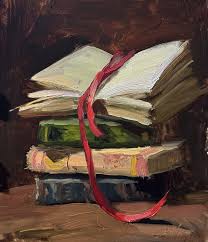
Sometimes a book comes along, captures the attention of an audience, and then seems to fade away. They’re not quite classics but their usefulness far outlasts their market. The list below is nothing but such books. Sure, if you want to make the case this one or that is in fact a classic, feel free. Two simple requirements to make this list- first, the book must educate. Second, the book must be a good read. Away we go…
Modern Art and the Death of a Culture by Hans Rookmaaker.
I was introduced to this outstanding book as a student at Grove City College in the 1980s. Dr. Andy Hoffecker was my prof. I took every class he offered. This one was amazing. Rookmaker, a close friend to Francis Schaeffer, draws parallel lines following the progress (better understood as regress) of modern art and modern philosophy. He demonstrates how one shapes the other. Suddenly, modern art is revealed to be not just silly, but foreboding.
The Birth of the Modern by Paul Johnson.
Johnson was a well-respected conservative Catholic historian. He wrote perhaps a dozen books that could be on this list. I chose The Birth of the Modern because of the time frame he set his prodigious mind to here. If you want to understand the forces behind the modern world, how technology helped create a culture, this book is for you. Johnson’s encyclopedic scope brings the heat by zeroing in on those moments that shaped our world.
Intellectuals by Paul Johnson
I couldn’t choose just one of Johnson’s books. This one provides a chapter each to exploring the thought of those who shaped the 20th century, exposing the Romans 1 folly at work. You’ll find the intellectual giants are little more than pygmies.
Class by Paul Fussell
Fussell was a cultural and literary historian. He wrote on a variety of subjects. Class is a quick read highlighting distinctions among varying classes in the United States. He blows away the silly notion that class is a function of mere wealth. He is entertaining, and astute in showing each of us fish much of the water we’ve never noticed despite swimming in it. You’ll see yourself, and those around you, much more clearly.
Monsters from the Id by E. Michael Jones
Jones does for horror fiction what Rookmaaker did for modern art, tracing the parallel lines of cultural rot and macabre literature. He has an uncanny ability to tie specific incidents from specific artists to specific ideologies. He does much the same thing with music in Dionysus Rising, and architecture in Living Machines. Monsters from the Id begins with Shelley’s Frankenstein and ends with Alien.
Honorable Mentions:
These last two did not make the list not because they aren’t good enough, but because they’re too good. They truly are classics, but still don’t get enough love. First, Amusing Ourselves to Death by Neil Postman. Postman is like a wise uncle, seeing things most of us miss. In Amusing Ourselves to Death he explores the distinctions between an image based culture and a word based culture, looking at ours through the lens of television. Someone really ought to do something similar for our internet based age.
Finally, The Abolition of Man by CS Lewis. If you haven’t read this little book, well, let’s just say that’s not good. So read it. You’ll be astonished at the prescience of Lewis, seeing the crack-up of postmodernism at its birth. Typical Lewis style. Penetrating analysis, that reads like nothing more challenging than a fruitful conversation. If you have read it, read it again. And read the fiction version, That Hideous Strength.

Dear RC,
Thank you. I have been looking for good books to read. I have especially appreciated Paul Johnson’s A History of the American People, so thank you.
Surprised that Degenerate Moderns didn’t make the list for you for Jones.
Yes, I should have at least mentioned it. It was like, it seemed to me, a carbon copy of Intellectuals. Let me know what you think of any of these you read.